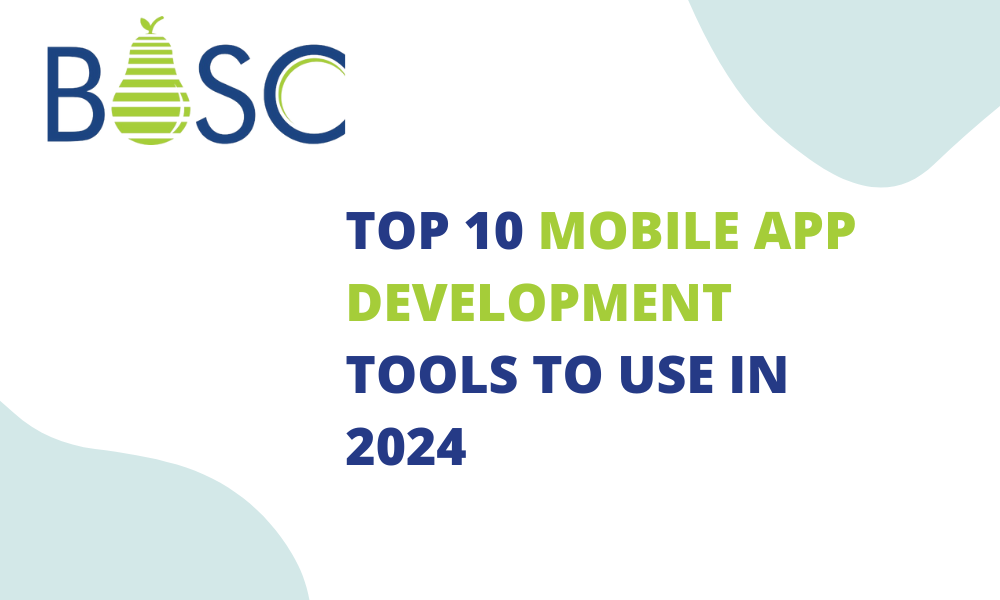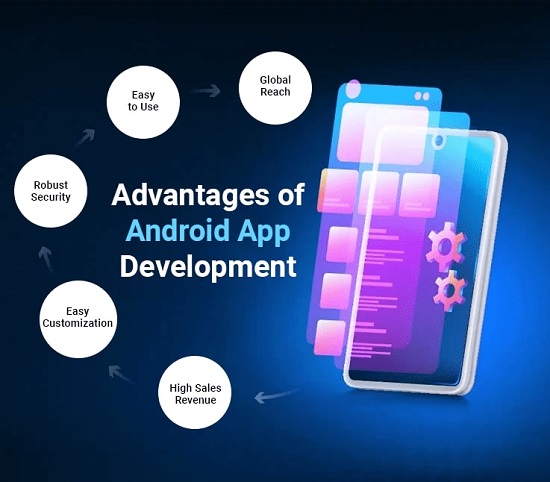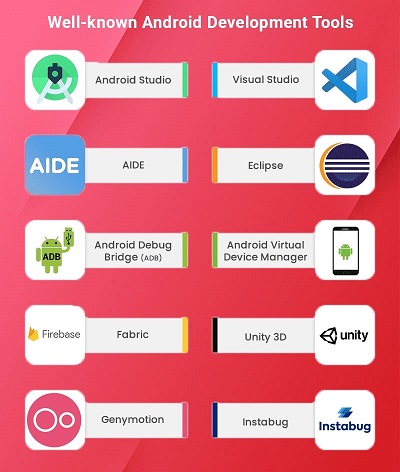Undoubtedly, the most popular mobile operating system in the world is Android. It has the ideal platform for making personalized apps. However, Android apps dominate wearables, computers, home appliances, tablets, and vehicles like mobile phones. There are so many android app development tools are available.
Worldwide programmers support Android to offer a high degree of customization and functionality. Hence, many mobile app development services opt for developing Android apps.
The unexpected growth of Android has led to a rise in the development of various app development tools. Therefore, selecting your app’s best Android development tools has become cumbersome. In this blog, we have given a list of the best Android development tools for your project in 2023.
What is Android App Development?
An app that is developed and supported by the Android operating system using an Android Software Development Kit (SDK) on Android Studio refers to the Android development process. Android is an open-source operating system created by Google mainly for mobile devices.
However, Android OS has been developed using the Linux Kernel. Due to the ability to easily modify, many Android developers use multiple GUIs, even with a similar basic operating system. Hence, the open-source code used to develop Android apps is the Android Open Source Project (AOSP).
What is Android architecture?
Android architecture is software with many components to support the needs of mobile devices. It is made up of the Linux Kernel, a set of C/C++ libraries that are made available through runtime, applications, and app framework services.
A pictorial representation of Android architecture will represent a distinct component.
1. Applications
Applications, both native and third-party, including clocks, games, and contacts, make up the top layer of the Android architecture. Hence, whatever we will construct is installed on this layer only.
A layer of an application that interacts with the Android runtime and makes use of classes and functions made accessible by the application framework.
2. Application Framework
The mobile app framework provides the classes that are used to develop Android apps. Additionally, it controls the user interface and app resources and offers a general abstraction for hardware access. It usually delivers the services to build the specific class, which is helpful for application creation.
An application framework has services like a telephony service, a notification manager, an NFC service, etc., that we can use for app development per the requirements.
3. Android Runtime
Instead of being an internal component of Android, the Android Runtime Environment is an essential aspect of Android and contains elements like core libraries and the Dalvik virtual machine.
JVM-like register-based virtual machines include Dalvik Virtual Machine (DVM). It is undoubtedly designed and optimized for Android to ensure that a gadget can run on different instances efficiently. The threading and low-level memory management rely on the Linux kernel.
Thus, core libraries in the Android runtime enables to integrate Android apps using the standard Java programming language.
4. Platform Libraries
Platform libraries that use various C/C++ and Java-based libraries, like SSL, Graphics, Surface Manager, SQLite, etc., to deliver support for Android development.
5. Linux Kernel
The heart and final layer of Android architecture are this one. It manages all drivers, like display, camera, and memory drivers, which are majorly needed for Android devices during runtime.
Additionally, it provides a layer of abstraction between the hardware of the device and the rest of the stack. It is also responsible for memory management, device management, resource accessibility, etc.
What are the benefits of Android app development?
Many businesses are swiftly moving towards Android app development to simplify and amplify their sales by getting more clients worldwide. As the Android app will cover a broader audience, you can reap the advantages of the Android app for your business and reach your target audience using the Android platform. Selecting an Android app for your business will help you to stay ahead of the competition, and you will be able to stay in this real world. Let’s have a look at some of its pros below.
1. Global Reach
One of the key advantages of Android app development is that it will reach a larger global audience. It’s the leading platform in the smartphone market in hugely populated countries. It also provides cost-effective app development solutions that help businesses scale up and grow their global reach compared to any other platform. Hence, the company is acquiring Android app development in the coming years.
2. Easy to Use
Because Java is so widely used with Android, it is elementary. Java language has a familiarity with Android, and because of that, it is highly intuitive to use. However, Java has a good set of libraries suited for developing high-end apps. Thus, it saves the organization’s development cost by creating an entire Android app which is a straightforward approach for the beginner of app development.
3. Robust Security
Security is one of the most significant concerns for any online business. Whenever we talk about the Android app platform, it gives the in-built powerful security features and regular updates by Google to make an app more secure and scalable.
Compared to iOS platforms, Android provides multiple security features and updates to create the application run smoothly without any bugs. Thus, security is yet another must-have benefit of Android app development.
Android has an advanced and updated system with no malware or security threat and locates its data structure. Furthermore, it keeps sending push notifications that help users to keep updated with its systems or apps.
4. Easy Customization
Android has complete flexibility and provides easy-to-customize features, which makes Android an excellent choice for app development. Hence, businesses that wish to make enterprise-grade apps with multiple features and functionalities benefit from this feature.
As it makes the changes simple or adds complicated app functionality, Android is proven to be the most effective platform for addressing business needs with a high-flexibility solution.
Programmers can rapidly implement or upgrade a wide range of tools and functions for easy data management and link them with modifications. The Android app platform’s features and functionality are helpful in your project.
5. High Sales Revenue
You can download Android apps from any channel but can’t download iOS apps from multiple channels. Android apps are downloadable from the Google Play store as the realtors select various websites to promote businesses. It is seen that many of the well-known Android app development companies are generating massive revenue with Android app development services.
The Android platform gives consumers a variety of sales and distribution channels and allows them to generate more business revenue. Thus, it will enable you to set up your own distribution and sales channels to promote your app effectively.
Which are the best Android development tools?
Android development uses various tools, as many of the alternatives are available, and it is complicated to identify which is best for you. Leading Android development tools will help you to make the project smooth and flexible.
1. Android Studio
It is the official Android IDE which was conceived and developed by Google. Android Studio depends on IntelliJ IDEA, and it is the most useful for Android projects.
It allows you to work with Kotlin language, Java, and C++ and enable your engineers to develop apps for tablets, smartphones, wearable gadgets, etc. It is free to download for Windows, Linux, and iOS platforms.
2. Visual Studio
It makes use of C++ and C# for developing Windows applications. However, now it has become an effective solution for developing Android and iOS applications. It provides an infinite number of templates for faster development, and it expands cloud-based tools with Azure. It also provides a seamless interface that helps developers code, test, debug, and deploy Android apps.
3. AIDE
With this app, experts can create Android apps directly on its smartphones. It supports the development of Java, C++, and Kotlin languages. App programmers can build, test, debug, and deploy apps without hassles.
4. Eclipse
It has an extensible plugin system and base workspace that aids the development team in customizing an environment with ease.
This platform is utilized to implement development environments and multiple other tools. Any programming language can use it as an IDE. Eclipse provides a fantastic interface to create a UI/UX and a visual code debugging tool to fix code errors.
5. Android Debug Bridge
A flexible command line tool that facilitates seamless communication between the gadget. An adb command class the distinct device actions, like installation and debugging of apps.
Developers can directly access the Unix shell to execute various commands. It is a client-server program which is having three fundamental components.
6. Android Virtual Device (AVD)Manager
A command line tool that allows engineers to create and manage AVDs from the command line.
AVDs allow experts to define a characteristic of an Android smartphone, Wear OS, or Android TV that is needed to simulate an Android Emulator. It makes the virtual devices dependent on the type of device you want to model and run the application.
7. Fabric
A flexible and capable mobile platform that provides various features and valuable kits to add extra functionalities to your Android apps. It also delivers crashlytics, the crash reporting service, which grants you to monitor Android crashes and will take adequate remediation steps.
Install Fabric into Android Studio and then implement Crashlytics into it. It gives an in-depth view of an app crash in the real development world.
8. Unity3D
A formidable cross-platform 3D engine uses to develop and operate the experiences in real-time. It is an IDE that allows beginners and experienced developers to create mobile apps, 3D games, and desktop apps.
Unity delivers features like 3D rendering and collision detection to develop 3D game work. Unity also provides a visual editor, which helps creators drag and drop elements in the image and change their properties.
9. Genymotion
The most popular Android emulator is dependent on VirtualBox. Experience resource-intensive 3D visual games like PUBG Mobile on a laptop or computer without experiencing any performance issues.
It lets you test your Android apps on various virtual devices and smartphones. It has plenty of sensors to ensure seamless interaction in a virtual Android environment.
10. Instabug
A tool used by Mobile app developers to track bugs and application crashes and monitor the app’s performance, the experts will fetch detailed reports. They will provide clear insight into the aspect of any app which does not meet desired software quality standards.
Instabug will automatically gather a broad range of technical information and make it easier for mobile app developers to examine and fix app issues.
Well-known Android Code Review Tools
Code review tools are created to identify coding bugs when it is completed or written. It automates a manual code review process which is exhausting and time-consuming since the programmers have to review thousands of code lines, and it validates them. Hence, this tool automates an entire procedure and saves effort and time.
1. Checkstyle
An automated code review tool that includes standard code guidelines requirements and incorporates custom rules to cater to the particular project guidelines. The entire process of automated review is accurate and more accessible. It is used for scaling and complicated projects but only supports Java coding.
2. Findbugs
It is developed to analyze Java byte code. It throws an error notification when it identifies problems with codes, a vulnerability in coding, slow performance, or security threats.
Developers will integrate a to-find security bugs plugin with security threats like bad cryptography, wrong conversation, and sensible sections.
3. Android Lint
It will automatically review a code and view a list of potential bugs. An IDE development tool can function in any environment in your project.
Let developers detect the issues like layout and icon issues, unused translations, internationalization problems, and inconsistent array sizes.

Conclusion
There are several different Android programming tools available. They allow you to focus on emerging challenges and manual tasks and enhance code quality. Developers can leverage unique and innovative features with the help of these tools.
Bosc Tech Labs is the leading Android app development company with a proven track record of delivering exceptional solutions to current issues.
You can connect with our development team anytime if you envision ushering a successful stint with your Android application.
Frequently Asked Questions (FAQs)
1. What is Android architecture?
It is a software stack of components that support the need of mobile devices. It includes Linux, the Kernel, and a number of C and C++ libraries that are made available through runtime, applications, and app framework services.
2. How will Android work internally?
Android utilizes a particular virtual machine, i.e., Dalvik Virtual Machine. Dalvik makes use of specific bytecode. Hence, you cannot run the standard Java bytecode on Android. It gives the tool “dx” to convert Java class files into “dex” files.
3. Which is the most accessible platform for Android app development?
The most recommended option for programmers is Android Studio, an official integrated development environment (IDE) for Android app development. It gives features which will make it easy to develop high-quality apps.
Book your appointment now







